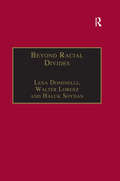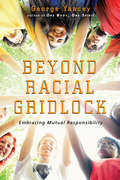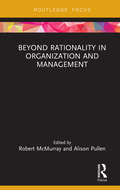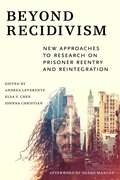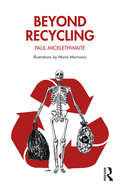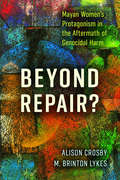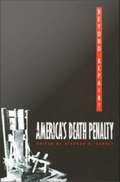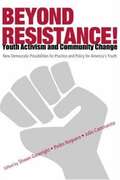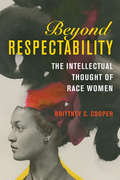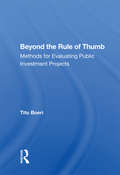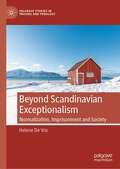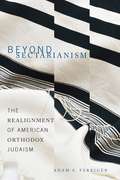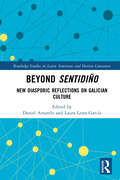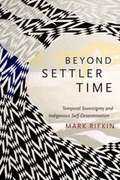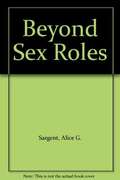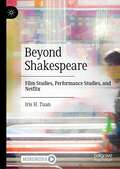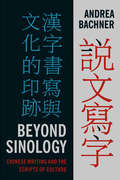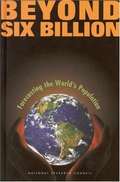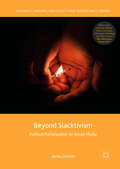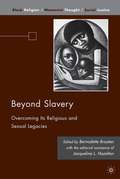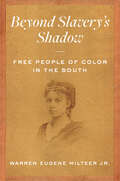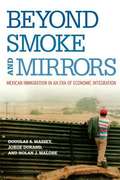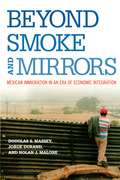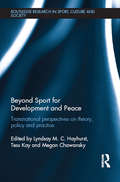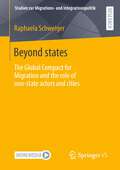- Table View
- List View
Beyond Racial Divides: Ethnicities in Social Work Practice (Contemporary Social Work Studies)
by Lena Dominelli Walter LorenzWritten by leading authorities in the field, this challenging book addresses complex issues of ethnicity and racial discrimination in ways that encourage further debate and analysis. Its main theme is that social work has been and remains, deeply implicated in racist policies and practices that have been locality specific, but that racism is also recognizable across borders as a phenomenon that appears everywhere. At the same time, the book focuses on innovative theories and practice which seek to promote an emancipatory social work which sets itself the goal of eradicating social injustice - particularly that applying to race. The contributors come from a wide range of countries and describe their experiences in tackling racism in social work at the levels of both theory and practice. This provides an impressive range of perspectives which cover models of social work created by people who have had to live with racism and find ways of overcoming it as well as those who have struggled to become able to express their own ethnicity without oppressing others. The concluding message of the book is a positive one - people can create a world that goes beyond racial divides by accepting, validating and celebrating diversity while at the same time recognizing that people share many commonalities with others which can be used to establish egalitarian relationships, realize social justice and communicate effectively with each other.
Beyond Racial Gridlock: Embracing Mutual Responsibility
by George YanceyChristians have struggled with racial issues for centuries, and often inadvertently contribute to the problem. Many proposed solutions have been helpful, but these only take us so far. Adding to this complex situation is the reality that Christians of different races see the issues differently. Sociologist George Yancey surveys a range of approaches to racial healing that Christians have used and offers a new model for moving forward. The first part of the book analyzes four secular models regarding race used by Christians (colorblindness, Anglo-conformity, multiculturalism and white responsibility) and shows how each has its own advantages and limitations. Part two offers a new "mutual responsibility" model, which acknowledges that both majority and minority cultures have their own challenges, tendencies, and sins to repent of, and that people of different races approach racial reconciliation and justice in differing but complementary ways. Yancey's vision offers hope that people of all races can walk together on a shared path--not as adversaries, but as partners.
Beyond Rationality in Organization and Management (Routledge Focus on Women Writers in Organization Studies)
by Robert McMurray Alison PullenSpanning the 20th and 21st centuries, the writers considered in this first book of the Routledge Focus on Women Writers in Organization Studies series make an important contribution to how we think about rationality in managing, leading and working. It provides a space in which to think differently about rationality, challenging dominant masculine logics while positioning relations between people centre stage. A critical and intellectually provocative text, the book provides a nuanced and practical account of rationality in organizational contexts, making it clear that women have and continue to write groundbreaking work on the subject: women like Lillian Moller Gilbreth, who was at the forefront of developments in scientific management, and Frances Perkins, who was the first female US cabinet secretary. Both are important not only for what they achieved but also as illustrations of the ways in which women have been written out of the accounts of managing and management thought. This matters not only because credit is denied to those who deserve it, but also because it impoverishes our understanding of complex organisational phenomenon. Where so much extant writing on managing and organizing is preoccupied with abstract notions of structure, strategy, metaphor and machines, the writers considered here explain why effective working and managing is primarily about seeing and working with people. Writers such as Arlie Hochschild, Mary Parker Follett and Heather Höpfl remind us that rationality cannot be decoupled from emotion or, where a system is to be rationalised, then it should start with and enhance the lives of people – be designed with people at the centre. In this sense, the book is not arguing for a wholesale rejection of rationality. Rather, authors call on readers to move beyond a preoccupation with rationality for its own sake, seeing it instead as a useful and highly contestable aspect of organizational life. Each woman writer is introduced and analysed by an expert in their field. Further reading and accessible resources are also identified for those interested in knowing more. This book will be relevant to students, researchers and practitioners with an interest in business and management, organizational studies, critical management studies, gender studies and sociology. Like all the books in this series, it will also be of interest to anyone who wants to see, think and act differently.
Beyond Recidivism: New Approaches to Research on Prisoner Reentry and Reintegration
by Andrea Leverentz, Elsa Y. Chen, and Johnna ChristianUnderstanding reentry experiences after incarcerationPrison in the United States often has a revolving door, with droves of formerly incarcerated people ultimately finding themselves behind bars again. In Beyond Recidivism, Andrea Leverentz, Elsa Y. Chen, and Johnna Christian bring together a leading group of interdisciplinary scholars to examine this phenomenon using several approaches to research on recently released prisoners returning to their lives. They focus on the social context of reentry and look at the stories returning prisoners tell, including such key issues as when they choose to reveal (or not) their criminal histories. Drawing on contemporary studies, contributors examine the best ideas that have emerged over the last decade to understanding the challenges prisoners face upon reentering society. Together, they present a complete picture of prisoner reentry, including real-world recommendations for policies to ensure the well-being of returning prisoners, regardless of their past mistakes.
Beyond Recycling
by Paul MicklethwaiteBeyond Recycling critically explores unasked questions around recycling and its prominent position in contemporary thinking about sustainability. It examines and challenges assumptions about why we appear to have so wholeheartedly committed to recycling as a cultural project. Recycling has become a commonplace notion and widespread practice. Yet its social, cultural and even environmental value has not been considered carefully enough. This book considers recycling as a contemporary cultural idea related to – but not wholly defied by – our response to material waste. It seeks to reclaim recycling from the environmentalists and waste management specialists, to explore the role it plays in wider contemporary discourse. As we become increasingly satiated, and in many cases sickened, by the excesses of modern consumerism, we are rethinking our relationship with the physical stuff that fills our lives. Dissatisfied with empty materialism, we seek new ways to reuse our material culture. Recycling, turning something considered to be waste into something with renewed value, is our primary collective response to the problems arising from consumption; and it is ripe for critical examination. Beyond Recycling is a fascinating read for conscious consumers and students in the creative arts, design, cultural studies, sustainability and environmental studies.
Beyond Repair?: Mayan Women’s Protagonism in the Aftermath of Genocidal Harm (Genocide, Political Violence, Human Righ)
by Alison Crosby M. Brinton LykesBeyond Repair? explores Mayan women’s agency in the search for redress for harm suffered during the genocidal violence perpetrated by the Guatemalan state in the early 1980s at the height of the thirty-six-year armed conflict. The book draws on eight years of feminist participatory action research conducted with fifty-four Q’eqchi’, Kaqchikel, Chuj, and Mam women who are seeking truth, justice, and reparation for the violence they experienced during the war, and the women’s rights activists, lawyers, psychologists, Mayan rights activists, and researchers who have accompanied them as intermediaries for over a decade. Alison Crosby and M. Brinton Lykes use the concept of “protagonism” to deconstruct dominant psychological discursive constructions of women as “victims,” “survivors,” “selves,” “individuals,” and/or “subjects.” They argue that at different moments Mayan women have been actively engaged as protagonists in constructivist and discursive performances through which they have narrated new, mobile meanings of “Mayan woman,” repositioning themselves at the interstices of multiple communities and in their pursuit of redress for harm suffered.
Beyond Repair? America's Death Penalty
by Stephen P. GarveyCan the death penalty be administered in a just way--without executing the innocent, without regard to race, and without arbitrariness? How does capital punishment in the United States fit with international human rights law? These are among the questions that leading legal scholars and journalists explore in Beyond Repair? All new, the essays in this collection focus on the period since 1976, when the Supreme Court held that capital punishment, in and of itself, does not violate the Constitution. In addition to reflecting on the most recent developments in the law, the contributors draw on empirical research to consider connections between newly available data and modern American death penalty procedures. A number of the essays scrutinize thinking about capital punishment. They examine why, following almost two decades of strong public support for the death penalty, public opinion in favor of it has recently begun to decline. Beyond Repair? presents some of the findings of the Capital Jury Project, a nationwide research initiative that has interviewed over one thousand people who served as jurors in capital trials. It looks at what goes through the minds of jurors asked to consider imposing the death penalty, how qualified they are to make such an important decision, and how well they understand the judge's instructions. Contributors also investigate the risk of executing the innocent, the role that race plays in determining which defendants are sentenced to death, and the effect of expanded restrictions on access to federal appellate relief. The postscript contemplates the peculiarities of our contemporary system of capital punishment, including the alarming variance in execution rates from state to state. Filled with current insights and analysis, Beyond Repair? will provide valuable information to attorneys, political scientists, criminologists, and all those wanting to participate knowledgeably in the debates about the death penalty in America. Contributors. Ken Armstrong, John H. Blume, Theodore Eisenberg, Phoebe C. Ellsworth, Stephen P. Garvey, Samuel R. Gross, Sheri Lynn Johnson, Steve Mills, William A. Schabas, Larry W. Yackle, Franklin E. Zimring
Beyond Resistance! Youth Activism and Community Change
by Shawn Ginwright Julio Cammarota Pedro NogueraOver the past decade, urban communities have experienced unprecedented social, economic, and political transformation. Globalization and de-industrialization have contributed to the exodus of jobs, produced higher levels of inequality, and consequent, furthered marginalization of the urban poor. Urban youth have been particularly affected by this transformation. The failure of urban school districts and the lack of jobs, health services and effective prevention and intervention programs have placed large numbers of low-income urban youth at risk. In the absence of policies and institutions that respond to the needs of youth, a climate of fear focused particularly on responding to fears of youth crime has also shaped a national consciousness about urban communities and the youth within them. Urban Youth and CommunityChangebrings together work by leading scholars who study urban youth and who have a grounded knowledge of the issues they face. A commitment to social justice and equity is aunifying theme for this volume, and each of the authors examines to varying degrees how such values and commitments can be incorporated into public policy. The goal of this edited volume is to draw on the knowledge and expertise of these scholars from various academic disciplines and to share with policymakers and the general public insights into the impact of punitive/zero tolerance policies on young people's educational experience and well being. These chapters also offer new ideas about how to support youth placed at risk by deteriorating circumstances in urban areas and offers recommendations on how to create more humane and responsive youth policies at the local, state and federal level.
Beyond Respectability: The Intellectual Thought of Race Women (Women, Gender, and Sexuality in American History)
by Brittney C. CooperBeyond Respectability charts the development of African American women as public intellectuals and the evolution of their thought from the end of the 1800s through the Black Power era of the 1970s. Eschewing the Great Race Man paradigm so prominent in contemporary discourse, Brittney C. Cooper looks at the far-reaching intellectual achievements of female thinkers and activists like Anna Julia Cooper, Mary Church Terrell, Fannie Barrier Williams, Pauli Murray, and Toni Cade Bambara. Cooper delves into the processes that transformed these women and others into racial leadership figures, including long-overdue discussions of their theoretical output and personal experiences. As Cooper shows, their body of work critically reshaped our understandings of race and gender discourse. It also confronted entrenched ideas of how--and who--produced racial knowledge.
Beyond The Rule Of Thumb: Methods For Evaluating Public Investment Projects
by Tito BoeriThis book discusses the rationale for correcting market prices in the evaluation of public investments. It also aims at covering techniques of project appraisals, such as the effects method, cost efficiency techniques, multicriteria analysis, and related logical frameworks.
Beyond Scandinavian Exceptionalism: Normalization, Imprisonment and Society (Palgrave Studies in Prisons and Penology)
by Helene De VosThis book explores how prison life is normalized in different countries, with a critical and detailed look at ‘Scandinavian exceptionalism’ — the idea that Scandinavian prisons have exceptionally humane conditions — and compares these prisons to ones in Belgium. It provides a more nuanced, systematic and contextualized comparison of normalization in two countries. Through analyzing policy and legislative documents, participant observation and interviews, it seeks to understand how normalization is implemented differently in prison legislation, policies and practices and compares the two societies for context. It also considers the material prison environment, security, the social environment and the use of time in prison. It provides insights into how normalization can be successfully and holistically implemented in both policy and practice, to contribute to a more ‘pure’ form of liberty deprivation as punishment without too many unintended effects.
Beyond Sectarianism: The Realignment of American Orthodox Judaism
by Adam S. FerzigerIn 1965 social scientist Charles S. Liebman published a study that boldly declared the vitality of American Jewish Orthodoxy and went on to guide scholarly investigations of the group for the next four decades. As American Orthodoxy continues to grow in geographical, institutional, and political strength, author Adam S. Ferziger argues in Beyond Sectarianism: The Realignment of American Orthodox Judaism that one of Liebman's principal definitions needs to be updated. While Liebman proposed that the "committed Orthodox" --observant rather than nominally affiliated--could be divided into two main streams: "church," or Modern Orthodoxy, and "sectarian," or Haredi Orthodoxy, Ferziger traces a narrowing of the gap between them and ultimately a realignment of American Orthodox Judaism. Ferziger shows that significant elements within Haredi Orthodoxy have abandoned certain strict and seemingly uncontested norms. He begins by offering fresh insight into the division between the American sectarian Orthodox and Modern Orthodox streams that developed in the early twentieth century and highlights New York's Congregation Kehilath Jeshurun as a pioneering Modern Orthodox synagogue. Ferziger also considers the nuances of American Orthodoxy as reflected in Soviet Jewish activism during the 1960s and early 1970s and educational trips to Poland taken by American Orthodox young adults studying in Israel, and explores the responses of prominent rabbinical authorities to Orthodox feminism and its call for expanded public religious roles for women. Considerable discussion is dedicated to the emergence of outreach to nonobservant Jews as a central priority for Haredi Orthodoxy and how this focus outside its core population reflects fundamental changes. In this context, Ferziger presents evidence for the growing influence of Chabad Hasidism - what he terms the "Chabadization of American Orthodoxy." Recent studies, including the 2013 Pew Survey of U.S. Jewry, demonstrate that an active and strongly connected American Orthodox Jewish population is poised to grow in the coming decades. Jewish studies scholars and readers interested in history, sociology, and religion will appreciate Ferziger's reappraisal of this important group.
Beyond sentidiño: New Diasporic Reflections on Galician Culture (Routledge Studies in Latin American and Iberian Literature)
by Amarelo, Edited by DanielBeyond Sentidiño: New Diasporic Reflections on Galician Culture is an interdisciplinary study of Galician literature, languages, and cultures. The volume brings together essays from fields across the humanities and social sciences to foster a discussion that incorporates new concepts that, as of now, are not part of the imaginary of Galiza: gentrification, language imperialism, youth unemployment, deruralization and deindustrialization, media control, technocapitalism, and gender and sexual normativity. It also serves to moderate a conversation about how independence from the political, material, and sociocultural networks of autonomic Galiza allows diasporic scholars to think of Galician culture in a de-essentializing manner. Working and living in the diaspora provides a lens through which to unmask the hegemonic neocolonial and neoliberal representation and reproduction of Galicianness promoted by different social, political, and mediatic powers.
Beyond Settler Time: Temporal Sovereignty and Indigenous Self-Determination
by Mark RifkinWhat does it mean to say that Native peoples exist in the present? In Beyond Settler Time Mark Rifkin investigates the dangers of seeking to include Indigenous peoples within settler temporal frameworks. Claims that Native peoples should be recognized as coeval with Euro-Americans, Rifkin argues, implicitly treat dominant non-native ideologies and institutions as the basis for defining time itself. How, though, can Native peoples be understood as dynamic and changing while also not assuming that they belong to a present inherently shared with non-natives? Drawing on physics, phenomenology, queer studies, and postcolonial theory, Rifkin develops the concept of "settler time" to address how Native peoples are both consigned to the past and inserted into the present in ways that normalize non-native histories, geographies, and expectations. Through analysis of various kinds of texts, including government documents, film, fiction, and autobiography, he explores how Native experiences of time exceed and defy such settler impositions. In underscoring the existence of multiple temporalities, Rifkin illustrates how time plays a crucial role in Indigenous peoples’ expressions of sovereignty and struggles for self-determination.
Beyond Shakespeare: Film Studies, Performance Studies, and Netflix
by Iris H. TuanWith joy and grace to accompany the readers to have the translocal tour to visit about thirty-seven works, this monograph applies the academic critical theories of Performance Studies, Film Studies, Psychoanalysis, Postmodernism, and Visual Culture, to interpreting the special selection works. The focus and common theme are on race, body, and class. With the background of COVID-19 since 2019 up to the present, the book offers the readers with the remarkable insight of human beings’ accumulated wisdom and experiences in surviving with the dreadful diseases like the plagues in Shakespeare’s time. After the supreme reading, may the global readers in the world acquire the knowledge and power to live in sustainability with education and entertainment of films, performances, and online streaming Netflix TV dramas.
Beyond Sinology: Chinese Writing and the Scripts of Culture (Global Chinese Culture)
by Andrea BachnerNew communication and information technologies provide distinct challenges and possibilities for the Chinese script, which, unlike alphabetic or other phonetic scripts, relies on multiple signifying principles. In recent decades, this multiplicity has generated a rich corpus of reflection and experimentation in literature, film, visual and performance art, and design and architecture, within both China and different parts of the West.Approaching this history from a variety of alternative theoretical perspectives, Beyond Sinology reflects on the Chinese script to pinpoint the multiple connections between languages, scripts, and medial expressions and cultural and national identities. Through a complex study of intercultural representations, exchanges, and tensions, the text focuses on the concrete "scripting" of identity and alterity, advancing a new understanding of the links between identity and medium and a critique of articulations that rely on single, monolithic, and univocal definitions of writing.Chinese writing—with its history of divergent readings in Chinese and non-Chinese contexts, with its current reinvention in the age of new media and globalization—can teach us how to read and construct mediality and cultural identity in interculturally responsible ways and also how to scrutinize, critique, and yet appreciate and enjoy the powerful multi-medial creativity embodied in writing.
Beyond Six Billion: Forecasting the World's Population
by National Research CouncilIs rapid world population growth actually coming to an end? As population growth and its consequences have become front-page issues, projections of slowing growth from such institutions as the United Nations and the World Bank have been called into question. Beyond Six Billion asks what such projections really say, why they say it, whether they can be trusted, and whether they can be improved. The book includes analysis of how well past U.N. and World Bank projections have panned out, what errors have occurred, and why they have happened.Focusing on fertility as one key to accurate projections, the committee examines the transition from high, constant fertility to low fertility levels and discusses whether developing countries will eventually attain the very low levels of births now observed in the industrialized world. Other keys to accurate projections, predictions of lengthening life span and of the impact of international migration on specific countries, are also explored in detail.How good are our methods of population forecasting? How can we cope with the inevitable uncertainty? What population trends can we anticipate? Beyond Six Billion illuminates not only the forces that shape population growth but also the accuracy of the methods we use to quantify these forces and the uncertainty surrounding projections.The Committee on Population was established by the National Academy of Sciences (NAS) in 1983 to bring the knowledge and methods of the population sciences to bear on major issues of science and public policy. The committee's work includes both basic studies of fertility, health and mortality, and migration; and applied studies aimed at improving programs for the public health and welfare in the United States and in developing countries. The committee also fosters communication among researchers in different disciplines and countries and policy makers in government, international agencies, and private organizations. The work of the committee is made possible by funding from several government agencies and private foundations.
Beyond Slacktivism: Political Participation On Social Media (Interest Groups, Advocacy And Democracy Ser.)
by James DennisBeyond Slacktivism examines how routine social media use shapes political participation. Many commentators have argued that activism has been compromised by “slacktivism,” a pejorative term that refers to supposedly inauthentic, low-threshold forms of engagement online. Dennis argues that this critique has an overly narrow focus. He offers a novel theoretical framework—the continuum of participation—to help illuminate how and why citizens use social networking sites to consume news, discuss civic matters, and engage in politics. This idea is explored in two interrelated settings. Firstly, in an activist context, through an ethnography of the campaigning organisation 38 Degrees. Secondly, within day-to-day life, by combining evidence of behaviour online with reflective diaries. Drawing on this rich data on individual-level attitudes and behaviours, Dennis challenges slacktivism as a judgement on contemporary political action. Beyond Slacktivism provides an account of how the seemingly mundane everyday use of social media can be beneficial to democracy.
Beyond Slavery
by Bernadette J. BrootenThis book looks at a United States that continues to be driven by racial and cultural divisions, from the disproportionately high number of incarcerated African Americans to heartfelt disagreements over the true nature of marriage and the proper role of faith in public policy.
Beyond Slavery's Shadow: Free People of Color in the South
by Warren Eugene MilteerOn the eve of the Civil War, most people of color in the United States toiled in bondage. Yet nearly half a million of these individuals, including over 250,000 in the South, were free. In Beyond Slavery's Shadow, Warren Eugene Milteer Jr. draws from a wide array of sources to demonstrate that from the colonial period through the Civil War, the growing influence of white supremacy and proslavery extremism created serious challenges for free persons categorized as "negroes," "mulattoes," "mustees," "Indians," or simply "free people of color" in the South. Segregation, exclusion, disfranchisement, and discriminatory punishment were ingrained in their collective experiences. Nevertheless, in the face of attempts to deny them the most basic privileges and rights, free people of color defended their families and established organizations and businesses.These people were both privileged and victimized, both celebrated and despised, in a region characterized by social inconsistency. Milteer's analysis of the way wealth, gender, and occupation intersected with ideas promoting white supremacy and discrimination reveals a wide range of social interactions and life outcomes for the South's free people of color and helps to explain societal contradictions that continue to appear in the modern United States.
Beyond Smoke and Mirrors: Mexican Immigration in an Era of Economic Integration
by Douglas Massey Jorge Durand Nolan J. MaloneIn a very real way, the Mexico-U.S. migration system functioned as a complicated piece of machinery in the years from 1965 through 1986. It was composed of a set of delicately balanced social and economic processes that had emerged gradually over many years in response to specific changes in the political economies of Mexico and the United States. Cross-border population movements had a characteristic form, and over time they acquired a relatively stable structure and a well- defined geographic organization. Migration between Mexico and the United States followed predictable paths in accordance with well-established scientific principles. Just as it is not advisable to take a wrench to a precision clock if one is not a qualified clockmaker, it is not wise to pull policy levers if one has no real conception of how the underlying system functions. Yet this is exactly what happened beginning in 1986, when the U.S. Congress and successive presidents presided over a series of legislative and bureaucratic changes that fundamentally changed the rules under which the Mexico-U.S. migration system operated.
Beyond Smoke and Mirrors: Mexican Immigration in an Era of Economic Integration
by Douglas S. Massey Jorge Durand Nolan J. MaloneMigration between Mexico and the United States is part of a historical process of increasing North American integration. This process acquired new momentum with the passage of the North American Free Trade Agreement in 1994, which lowered barriers to the movement of goods, capital, services, and information. But rather than include labor in this new regime, the United States continues to resist the integration of the labor markets of the two countries. Instead of easing restrictions on Mexican labor, the United States has militarized its border and adopted restrictive new policies of immigrant disenfranchisement. Beyond Smoke and Mirrors examines the devastating impact of these immigration policies on the social and economic fabric of the Mexico and the United States, and calls for a sweeping reform of the current system. Beyond Smoke and Mirrors shows how U.S. immigration policies enacted between 1986–1996—largely for symbolic domestic political purposes—harm the interests of Mexico, the United States, and the people who migrate between them. The costs have been high. The book documents how the massive expansion of border enforcement has wasted billions of dollars and hundreds of lives, yet has not deterred increasing numbers of undocumented immigrants from heading north. The authors also show how the new policies unleashed a host of unintended consequences: a shift away from seasonal, circular migration toward permanent settlement; the creation of a black market for Mexican labor; the transformation of Mexican immigration from a regional phenomenon into a broad social movement touching every region of the country; and even the lowering of wages for legal U.S. residents. What had been a relatively open and benign labor process before 1986 was transformed into an exploitative underground system of labor coercion, one that lowered wages and working conditions of undocumented migrants, legal immigrants, and American citizens alike. Beyond Smoke and Mirrors offers specific proposals for repairing the damage. Rather than denying the reality of labor migration, the authors recommend regularizing it and working to manage it so as to promote economic development in Mexico, minimize costs and disruptions for the United States, and maximize benefits for all concerned. This book provides an essential "user's manual" for readers seeking a historical, theoretical, and substantive understanding of how U.S. policy on Mexican immigration evolved to its current dysfunctional state, as well as how it might be fixed.
Beyond Sport for Development and Peace: Transnational Perspectives on Theory, Policy and Practice (Routledge Research in Sport, Culture and Society)
by Tess Kay Lyndsay M. Hayhurst Megan ChawanskyDebates around the ‘sport for development and peace’ (SDP) movement have entered a new phase, moving on from simple questions surrounding the utility of sport as a tool of international development. Beyond Sport for Development and Peace argues that critical research and new perspectives and methodologies are necessary to balance the local aspects and global influences of sport and to better understand the power relations embedded in SDP on a transnational scale. As the era of the Millennium Development Goals gives way to a new agenda for sustainable development, this book considers the position of SDP. The book brings together contributors from 15 different countries across the developed and developing worlds, including academic researchers and ‘on the ground’ experts, practitioners and policy-makers, to provide one of the most diverse set of perspectives assembled in SDP scholarship. Looking to the renewed development agenda, its authors explore theoretical, policy and practical dimensions that address the broadening geographical and cultural spread of SDP, the emergence of issues such as child protection within it, its increased capacity for critical reflection on practice, and its potential for new collaborative approaches to knowledge production. Through its combination of academically-led chapters paired with practice-oriented ‘responses’ it offers an important reconceptualization of SDP as a contributor to development policy, and opens up important new avenues for studying and ‘practising’ SDP. Beyond Sport for Development and Peace is therefore essential reading for all researchers, advanced students, policy-makers and practitioners working in sport development or international development.
Beyond states: The Global Compact for Migration and the role of non-state actors and cites (Studien zur Migrations- und Integrationspolitik)
by Raphaela SchweigerThis book investigates the role and influence of non-state actors (NSAs) and local authorities in the process leading to the adoption of the 2018 Global Compact for Migration (GCM), the first intergovernmental negotiation of its kind at the UN. The research draws upon methods initially applied to assess global climate negotiations, and for the first time analyzes the influence of NSAs and local authorities in an international negotiation on migration. It builds on an assessment of the state of the art on global migration governance, adding new perspectives and insights. The analysis of the influence of NSAs and local authorities is backed by an online survey of participating stakeholders, interviews with key actors, and hundreds of other primary sources obtained from the process. The author finds that the UN system’s willingness to onboard NSAs was key to creating the GCM as it stands today. While the research finds little direct influence from NSAs during the negotiations, the first draft of the GCM was very much informed by their input. Local authorities, still new to the global stage, made the case for their further inclusion in global migration governance.
